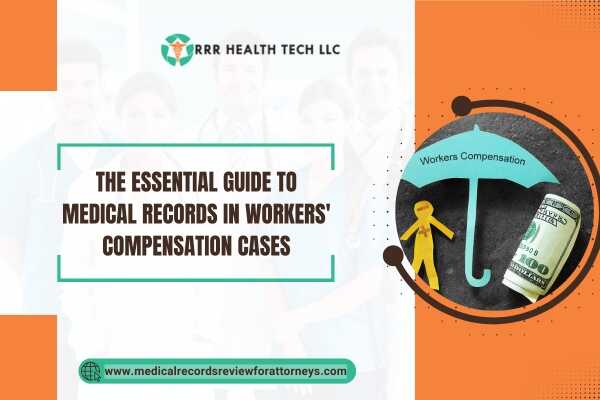
Introduction
Workers’ Compensation Cases can be quite a handful for the lawyers. Indeed, one of the biggest issues in these cases is how to appropriately manage medical records. Here, we explore the importance of medical records in Workers’ Compensation Cases, their management in appropriate manner and how our medical record review services in the USA are an asset for legal practitioners.
Understanding Workers’ Compensation and Medical Records
What is Workers’ Compensation?
A Workers’ Compensation Cases is a form of an insurance which contains wage and medical benefits which are offered to employees who have sustained an injury within their work environment. Such policies are rather advanced and great insight into their intricacies would greatly benefit attorneys in this area as it relates to the settlement of claims in Workers’ Compensation Cases.
The Role of Medical Records
Medical evidence is the most important element in a Workers’ Compensation Cases. They contain important information about the employee’s injury, his treatment and their prognosis, all of which help to give credence to the claim. Well-constructed and presented medical documents have great potential towards altering the final verdict of a case.
Key Points to Note about Medical Records in Workers’ Compensation Cases
1. Importance of Accurate Medical Records
Medical records should link injuries sustained to Workers’ Compensation Cases medical evidence such as:
- Employment and the injury in question being two components that are interrelated.
- Extent of the injury also needs to be aptly documented as well.
- Justifying claims pertaining to medical treatment and lost income.
2. Types of Medical Records
The need to recognize various categories of the medical records is important for attorneys:
- Initial Evaluation Reports: Record the initial encounter with a healthcare provider.
- Treatment Records: Provide details of the treatment provided and the procedures performed.
- Diagnostic Imaging Reports: Encompass x-rays, MRI’s, CT scans that are instrumental in showing injury sites.
- Disability Evaluations: Consider the extent to which the based on the injury, the worker can perform designated work.
3. Common Challenges in Managing Medical Records
Attorneys often face several challenges when dealing with medical records:
- Incomplete Records: Paucity or incompleteness of records can destabilize a case.
- Delayed Access: Obtaining medical records can be time-consuming, impacting case timelines.
- Privacy Concerns: Navigating HIPAA regulations while obtaining necessary records.
Best Practices for Organizing Medical Records
1. Establish a Systematic Approach
Implementing a systematic approach for organizing medical records can enhance efficiency. Consider the following strategies:
• Chronological Order: All the records should be arranged according to date to facilitate easy reference of the sequence of treatment chronology.
• Digital Storage: Keep the records in secured online spaces for enhanced convenience and sharing.
• Labelling: Make sure that any documents can easily be found by labelling them appropriately.
2. Regular Reviews and Updates
Consistent review and update of the medical records is an important step in avoiding obsolescence of all information included in the records maintained in the practice. This practice enables the lawyers to conduct effective preparations for the hearings and negotiations.
3. Collaboration with Medical Professionals
Building strong relationships with medical professionals can facilitate better access to records and insights into the case. Encourage open communication to address any discrepancies in the records.
How Our Medical Record Review Services Assist Attorneys
Overview of Our Services
We specialize in providing comprehensive medical record review services tailored for attorneys handling workers’ compensation cases. Our team of experts ensures that you have the most accurate and relevant medical information at your disposal.
Benefits of Our Services
- Thorough Analysis: We conduct in-depth analyses of medical records to identify key information that supports your case.
- Expert Insights: Our team provides expert opinions on medical issues, helping you understand the implications of the records.
- Time Efficiency: By outsourcing medical record reviews, attorneys can focus on other critical aspects of their cases.
Case Studies
Case Study 1: Overcoming Incomplete Medical Records
Overview of the Case: The worker was injured while performing his job. The back injury sustained was a critical one for such medical & history documents at the first. Absent documents were essential treatment’s particulars.
Challenges: In view of the deficiency of these detailed records, it became challenging to gauge the extent of the injury and even the extent to which the worker was able to take their up the job.
Solutions: The lawyer made use of our services, which performed a review of the contacted health care provider’s missing documents and assisted in their retrieval.
Compensation: After the detailed medical records were acquired, the attorney was able to represent the Workers’ Compensation Cases which helped with the outstanding medical bills and loss of income sues to the injuries obtainable settlement.
Case Study 2: Navigating Privacy Concerns
Overview of the Case: An Attorney had a case knowing that his client was an employee who had several injuries from a work-related accident. The client was unwilling to provide his medical records because of privacy reasons and protection.
Challenges: The medical records and treatment that the client undertook were important for case-building but the client had concerns about how their private information would be used in the processes.
Solutions: The client was guided on the HIPAA compliance and assured of confidentiality at all times. A release form was developed with the lawyer’s help, designating the records required for the case.
Compensation: When the legal counsels obtained relevant medical files, it became easy to argue the case and the outcome was a win for the client.
Conclusion
In conclusion, medical records play a pivotal role in the success of Workers’ Compensation Cases. Attorneys must prioritize the accurate management and organization of these records to effectively advocate for their clients. By leveraging our medical record review services, legal professionals can enhance their case strategies, overcome common challenges, and ultimately achieve better outcomes for their clients.
